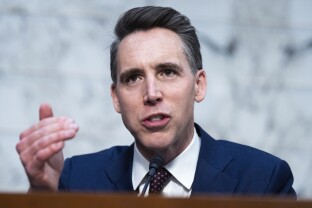States that rely heavily on federal funds are trying to unravel what the Trump administration’s anticipated aid freeze could mean for their budgets and services.
But Republican senators from those states quickly lined up behind the president as the White House tried to walk back the scope of the original memo. A federal judge temporarily blocked the freeze from taking effect Tuesday afternoon.
“It’s a temporary review. It’s not gonna last long. And it hasn’t even gone into effect,” said Sen. Josh Hawley, who represents Missouri, a state that relies on the federal government for almost half of its operating budget, hours before the freeze was set to take effect on Tuesday afternoon. “People are making this out to be more than it is.”
Republicans supported the freeze, even as one acknowledged that his home state had a limited ability to foot the bill. Sen. Tommy Tuberville told NOTUS that Alabama “can wait” while the Trump administration reviews program funding.
“We can’t afford it for a long period of time, but it’s going to be a review,” Tuberville said.
The scope of the intended freeze was unclear. But agencies in states including Kansas, Missouri, Arkansas and Oklahoma that rely on the federal government to fund programs — from disaster response to social services — either did not respond to a request for comment or told NOTUS it was too early to tell how the freeze would affect their operations and programs.
“Oklahoma Human Services is working with our federal partners to learn more about any potential effects on our programs. We will continue to communicate with partners and clients as we learn more,” the state agency told NOTUS in a statement Tuesday afternoon.
Other states were left similarly confused by the announced freeze.
“With very few details and specifics available, virtually no time for ample review and consideration, and no direct communication to date, states are left to plan for the worst,” said Democratic Gov. Tony Evers of Wisconsin in a letter to Donald Trump, requesting a delay. “Wisconsinites and millions of Americans who are rightfully alarmed and concerned by this unprecedented decision are left scrambling.”
The last-minute stay by a federal judge provided some reprieve as states struggled to figure out what was captured by the sweeping memo. On Tuesday, the White House did little to clarify which programs would be affected, saying that “direct benefits” were not part of the freeze.
“This isn’t a freeze on everything,” Sen. Markwayne Mullin of Oklahoma told NOTUS, adding he didn’t think it was a “big issue.”
“This is no different than what the Biden administration did when they came in, put a freeze on some things, just to make sure it aligns with their priorities,” Mullin said — but he wasn’t able to name specific programs Joe Biden froze.
Republicans, including Majority Leader John Thune, played down how extensive the freeze could have been. Thune argued that reviewing federal fund disbursements is nothing out of the ordinary for a new administration — but the abrupt memo with little guidance was far from a carefully choreographed rollout, creating panic in and out of Washington.
Sen. John Kennedy said the hubbub around the memo, which he said was “not artfully drafted,” was “much to do about nothing” and cash-poor states would “survive it just fine.”
His state, Louisiana, reported that federal funds make up nearly half of its revenue for the current fiscal year.
“Taking a pause to evaluate grants and programs is entirely appropriate,” Sen. Cynthia Lummis of Wyoming said. “I think my state will be fine.”
—
Nuha Dolby, Emily Kennard and Em Luetkemeyer are NOTUS reporters and Allbritton Journalism Institute fellows.
Sign in
Log into your free account with your email. Don’t have one?
Check your email for a one-time code.
We sent a 4-digit code to . Enter the pin to confirm your account.
New code will be available in 1:00
Let’s try this again.
We encountered an error with the passcode sent to . Please reenter your email.


